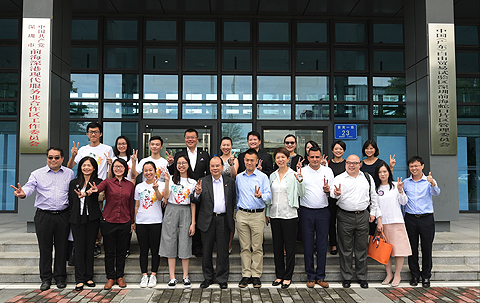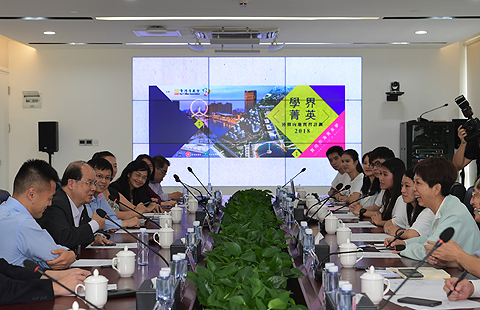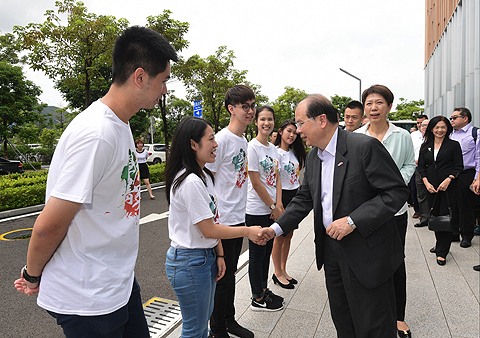Boost development opportunities for youths
12 August 2018
Attaching great importance to youth development, the current-term Government strives to maximise opportunities for young people to achieve diversified development and upward mobility and to pursue their goals.
One of our on-going initiatives in this regard is the Funding Scheme for Youth Internship on the Mainland (the Funding Scheme), which aims to help young people carve out their career paths through broadening their horizons, seeking self-advancement and obtaining earlier opportunities to acquire work experience.
Since its launch in 2014-15, the Funding Scheme has subsidised 466 internship projects. This year (2018-19), total funding of around $106.5 million has been approved for 135 internship projects run in various parts of the Mainland, such as Beijing, Guangdong, Shanghai, Chongqing, Jiangsu and Inner Mongolia, to benefit about 3 600 expected participants.

|

|

|
On the day before yesterday (10 August), accompanied by the Secretary for Home Affairs and non-official members of the Youth Development Commission, I went to Shenzhen to visit Hong Kong interns working in the Qianhai and Nanshan districts. Visits to a number of non-governmental organisations running the internship projects were included in our itinerary. The projects offer placements of four to six weeks to more than 80 young interns in total.
We toured the interns’ workplaces and met with representatives of the host enterprises and project organisers. Afterwards we were joined by some 20 interns at lunch to meet and chat in a casual environment. We learnt a lot about their work and life as interns on the Mainland, and took the opportunity to express our support for them over the meal.
Some interns remarked that the Funding Scheme allowed them to experience in person the working environment of different trades and job types on the Mainland, and to interact with their Mainland counterparts and understand more about their business operations. All these could help them broaden their perspectives and enhance their employability. Furthermore, it offered a great opportunity for them to learn more about the development prospects and direction of the Guangdong-Hong Kong-Macao Bay Area, which could serve as reference for their future career and entrepreneurial planning.
Some interns said they would look forward to weekends not because they could take a rest, but because they could join tours or visits to places of interest to appreciate the local cultures and characteristics at leisure. They enjoyed experiencing the local way of life, like the convenience of the express rail link, bike sharing, mobile payment apps and on-line shopping. At work they got to meet interns and colleagues from other parts of the country. Over time, workmates became friends and started to look after one another. During my visit, I did see some good friendships there. Evidently the Funding Scheme has also opened a window for deeper mutual understanding between the young people from Hong Kong and the Mainland.
Through the Funding Scheme, the interns have gained better knowledge and first-hand information about the Mainland’s development. Some of them who knew little about the Mainland before joining the project have their misconceptions cleared up after living there as an intern.
Separately, there are also new developments in the Member Self-recommendation Scheme for Youth (the Self-recommendation Scheme). Successfully launched on a pilot basis last October, the scheme attracted 1 179 applicants for the first batch of 11 seats on five government advisory boards and committees. The impressive performance of candidates has triggered “a race for talent” among policy bureaux, which have been vying with each other to recruit the candidates to their own array of committees. Since 1 April this year, apart from the 11 appointees, other participants have also been appointed to fill another 46 committee seats.
The Self-recommendation Scheme has now been extended to cover more committees spanning a variety of policy areas. Two rounds of recruitment will be conducted each year to provide more opportunities for young people to participate in policy discussion. Offering 20 seats on ten committees, the first phase of the expanded scheme received an overwhelming response. A total of 1 511 eligible applications were received during the application period from 15 June to 16 July 2018, exceeding the record of the pilot phase. The Council for Sustainable Development attracted the most applicants, followed by the Lantau Development Advisory Committee, the Community Investment and Inclusion Fund Committee and the Transport Advisory Committee.
The numbers of applications received in respect of the ten government advisory committees are set out in the table below:
| No. of eligible applications received | |
| Council for Sustainable Development | 303 |
| Lantau Development Advisory Committee | 216 |
| Community Investment and Inclusion Fund Committee | 208 |
| Transport Advisory Committee | 145 |
| Community Sports Committee | 125 |
| Advisory Committee of the Partnership Fund for the Disadvantaged | 117 |
| Committee on Community Support for Rehabilitated Offenders | 108 |
| Food Wise Hong Kong Steering Committee | 106 |
| Joint Committee on Student Finance | 98 |
| Advisory Committee on Enhancing Self-Reliance Through District Partnership Programme | 85 |
| Total: | 1 511 |
At the same time, the current-term Government aims to increase the overall ratio of youth members (i.e. those aged between 18 and 35) on government boards and committees to 15% within its tenure (i.e. by the end of June 2022). Thanks to the efforts of all bureaux and departments, this ratio has increased satisfactorily by 1% (65 seats) from 7.8% (464 seats) at the end of 2017 to the current 8.8% (529 seats).
The large number of applications reflects that our younger generation care about people’s livelihood and the community’s development. Building on the success of the Self-recommendation Scheme, the Government will continue to open up more channels to listen to and connect with the youth by giving them more opportunities to participate in public affairs.

